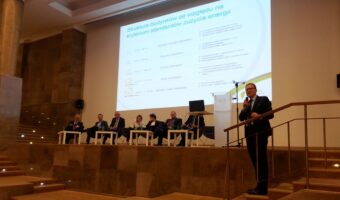Poland struggles with poor air quality. Four out of the five top-polluted large cities in the European Union are located in Poland. According to the European Commission’s estimates, 44 thousand people in Poland die prematurely each year due to air pollution. Fuel combustion for heating purposes in the households is a key source of pollution.
How to solve the problem of smog in Poland?
On 18th of September the Polish Ministry of Development held a conference on air quality. The conference gathered the representatives of government and regional administration, NGOs, scientists, energy entrepreneurs and journalists. Deputy Prime Minister Mateusz Morawiecki underlined the importance of tackling smog and energy poverty in Poland. He announced that revenues obtained from the recently introduced fees of foil bags would be used to help people who cannot afford good quality boilers and fuel.
Andrzej Guła, the leader of Polish Smog Alarm, showed that the poor energy efficiency of homes is a key factor behind the low air quality In Poland. In the panel discussion, Jadwiga Emilewicz, the Deputy Minister of Development, recalled the regulation on boiler quality coming into force on 1 October 2017, and announced that the act on solid fuel quality, which regulates quality standards for coal sold for individual use, would soon be ready. Kazimierz Smoliński, the Deputy Minister of Infrastructure and Construction, also promised that the government will cooperate with local administration to deliver technical support to owners of detached houses that will be aimed at improving the energy efficiency of buildings.
Piotr Lewandowski, the IBS President, stressed the need to support the energy poor with comprehensive assistance, going beyond the energy supplement that has been proved to be an ineffective policy instrument. He also emphasized the difference between energy poverty and income poverty: as only 50% of the energy poor in Poland are also income poor, energy poverty requires well-targeted instruments which go beyond income support.
Air Quality and Energy Efficiency – Małopolska 2017
On September 29th we participated in the conference “Air Quality and Energy Efficiency – Małopolska 2017” in Krakow. The conference was organised by The Małopolska Region Centre for Energy Efficient Buildings in cooperation with the Institute of Environmental Economics. The Institute for Structural Research was represented by Piotr Lewandowski and Konstancja Ziółkowska. We had the opportunity to present the results of our on-going study on the labour market effects of thermal retrofit of residential buildings in Poland. The conference was an opportunity to exchange knowledge between researchers in various fields that are essential for improving the air quality in Poland: construction engineers, air pollution experts and social scientists. Several speakers stressed that the lack of awareness among Polish citizens on how to act to improve energy efficiency and air quality is a serious obstacle to reducing the air pollution in Poland. Another issue recurring in many of the speeches was the lack of appropriate, precise data on the housing stock in Poland, which would allow to fully determine the scale of needs and the possible effects obtained by thermal retrofit.
The results of our study on the labour market effects of thermal retrofit of residential buildings in Poland will be available on our website later this year.
Energy Poverty and Unhealthy Homes – Assessing the causes and policy implications
The issue of energy poverty was discussed also at the workshop “Energy Poverty and Unhealthy Homes – Assessing the causes and policy implications” that took place in Brussels on September 28. The aim of the meeting was to review the Energy Poverty Index, developed by OpenExp on behalf of the European Climate Foundation. The implications for the design of tailored policy measures at EU and national levels were also discussed. The meeting gathered the representatives of several EU countries who shared their own experience in both research on energy poverty and implementing policies aimed at eradicating it. The Institute for Structural Research was represented by Piotr Lewandowski and Katarzyna Sałach. Piotr Lewandowski presented the latest IBS’s research on energy poverty in Poland. The results will be covered in the forthcoming IBS paper. At the moment, the presentation is available below.
ks, kz, pl, am
***
Institute for Structural Research conduct research about the energy poverty in Poland since 2015. The aim of the project is to show the factors affecting the phenomenon of energy poverty in Poland and to identify effective social policy instruments to counter this problem.
All findings are published on our website: see

